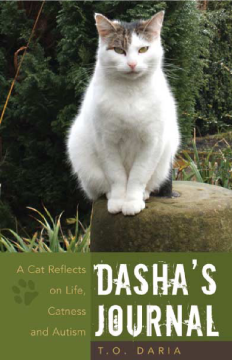
Additional Information
Book Details
Abstract
Just a few weeks old, Dasha the cat found herself in a family with an autistic child. The publication of Temple Grandin's book Animals in Translation: Using the Mysteries of Autism to Decode Animal Behaviour turned the household into a research laboratory, with the humans observing Dasha's behaviours and the cat experimenting with the `human guinea pigs'.
The feline perspective provides a new outlook on autism conditions, challenging long established stereotypes and analysing controversies in the field with an unbiased attitude and humour. The text is interspersed with Dasha's 'wisdoms', 'research notes' and definitions of concepts based on her own understanding, such as 'A pet shop is a place where humans come to be adopted by the animals who are brave enough to take a responsibility of looking after them.'
Dasha's Journal provides research-based information in an amusing and accessible form and makes serious and complicated issues such as sensory perception, memory, communication, savant skills and challenging behaviours in autism easily understandable for the general reader.
As a person with Asperger's Syndrome, I cannot help but be troubled by how much misinformation abounds concerning autism. However, after reading Dasha's Journal, I have to give T.O. Daria the best objective comment that I can for a non-autistic writer: she gets it absolutely right!
Edgar Schneider, author of Discovering My Autism: Apologia Pro Vita Sua (with apologies to Cardinal Newman)
It's a brilliantly quirky little book with some of the finest and most scholarly insights I've seen into autism-spectrum conditions.
Times Higher Eductional Supplement
Dasha the cat's journal is a brilliantly conceived book which analyses the misunderstandings that a family have of people on the spectrum from the perspective of a disinterested observer (the family cat)... I found it wonderfully uplifting to read a book which describes my world in the way I would descibe it, and not have myself reduced to a list of problem behaviours and misunderstandings... Dasha wonderfully avoids being felinomorphic throughout the book, but tries, successfull, to comprehend autistic behaviour for what it is: perfectly normal reactions to the world as we experience it... if I could only get a few more researchers to take on that view, maybe I could stop them all barking up the wrong tree!
Asperger United
Dasha's Journal is a charming and original way of explaining the mystery that is autism. Dasha is a cat who lives in an "autistic" family. Her observations on the behaviour of both the autistic and neurotypical members of the family put the "problems" of autism into perspective; we are often told that autistic people are "mindblind", but, as Dasha shows, neurotypicals are just as blind to the ways of those who are "differently abled", whether autistics or cats! The Journal is quirky and amusing, but beneath the humour lies a serious and profound examination of autism and the misconceptions that surround it.
Charlotte Moore, author of George and Sam: Autism in the Family
A heartwarming book providing insights into how autistic persons perceive and interact with the world as only a cat can. As Dasha "meows" about her human members of the family we learn how autism is a different, rather than a disordered way of being. This book is a delightful and informative read.
Stephen M. Shore, EdD, Executive Director of Autism Spectrum Disorder Consulting, Board of Directors for the Autism Society of America and the Asperger's Association of New England
I found it wonderfully uplifting to read a book which describes my world in the way I would describe it, and not have myself reduced to a list of problem behaviours and misunderstanding.
Asperger United
Dasha is a brilliant feline! She is flat-out funny, wise beyond her cat years and a true champion of autistics everywhere! Read her journal and let her teach you about autism!
Liane Holliday Willey, EdD, author of Pretending to be Normal: Living with Asperger's Syndrome
Comparisons and humorous observation that may both surprise and enlighten you. This is a very thorough book. Much of the information would usefully underpin strategies that teachers or therapists might develop to support and autistic child. At nearly 150 pages its length is not off-putting and with the additional glossary, some useful notes and references and a bibliographyit provides a very solid resource.
Patoss Bulletin
Dasha's Journal is a much needed work that blends the literary journey with an engaging scientific study. The book provides exemplary and cunning analogies to help the reader better appreciate the inner world of the autistic person. The author's thesis exemplifies autism as a different way of thinking with both strengths and weaknesses. The final result is a funny, clever, and up to date exposition of our present day knowledge regarding autism.
Manuel F. Casanova, MD, Gottfried and Gisela Kolb Endowed Chair in Psychiatry, Associate Chair for Research, University of Louisville, KY
Table of Contents
| Section Title | Page | Action | Price |
|---|---|---|---|
| Introduction | |||
| Principles | |||
| Pillar 1: Standards to ensure a quality child protection response | |||
| Pillar 2: Standards on child protection risks | |||
| Pillar 3: Standards to develop adequate strategies | |||
| Pillar 4: Standards to work across sectors | |||
| Glossary | |||
| Relevant legal instruments | |||
| Key resources for cross-cutting issues |
